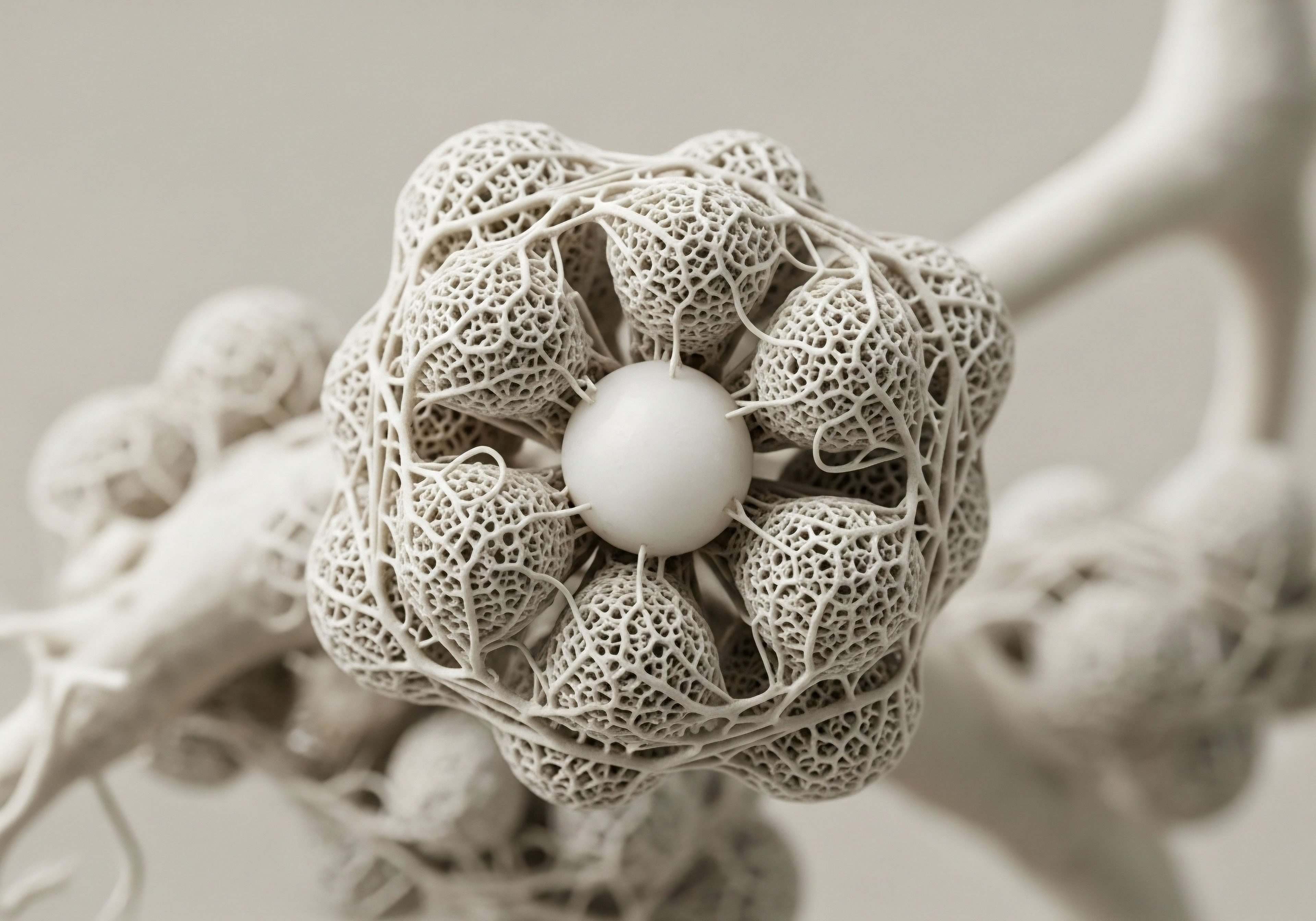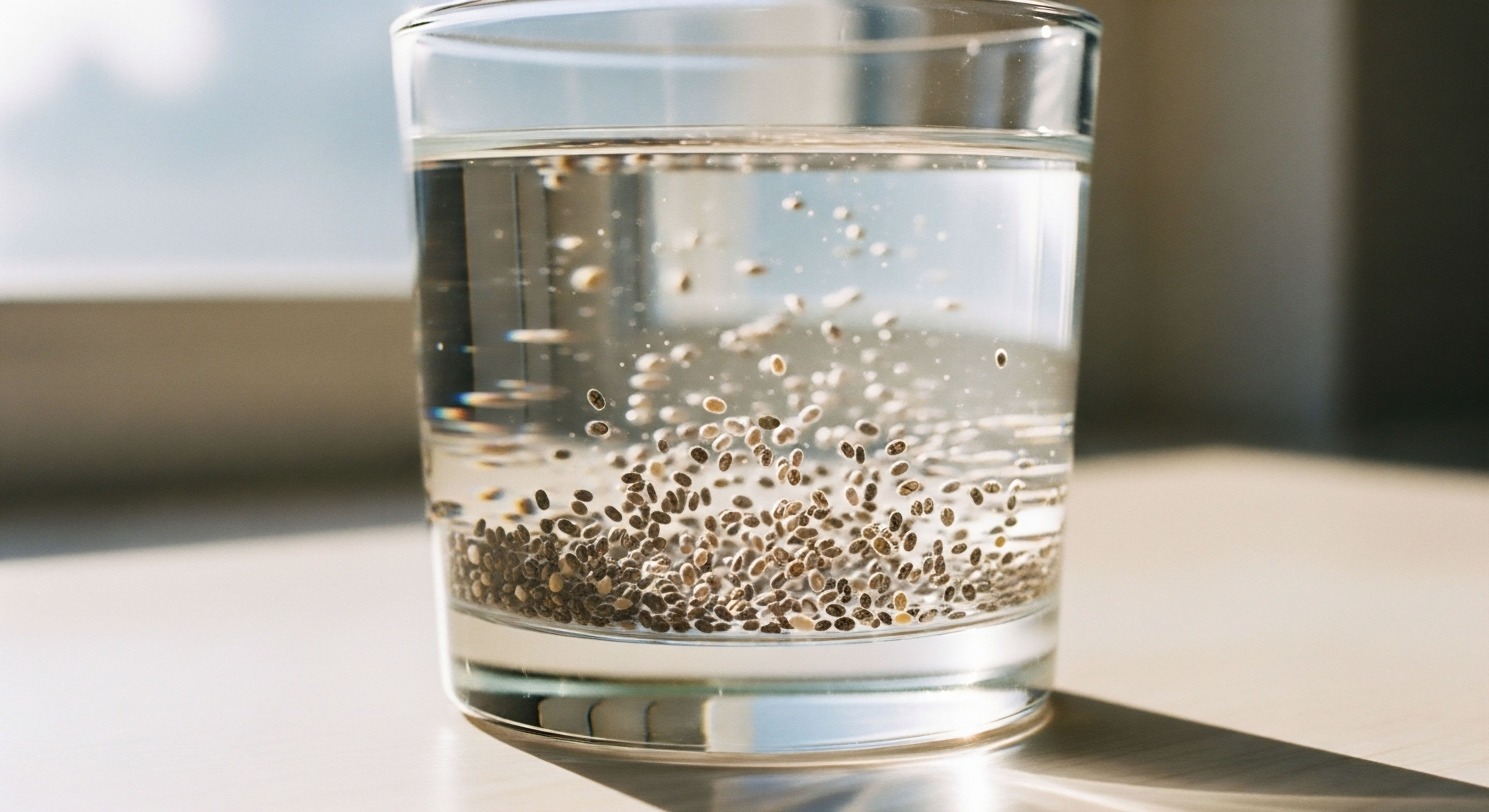

Fundamentals
Have you ever experienced a persistent feeling of unease, a subtle yet pervasive sense that your body is not quite operating as it should? Perhaps you notice digestive discomfort, a lingering fatigue that no amount of rest seems to alleviate, or even a mental fogginess that obscures your clarity of thought.
These sensations, often dismissed as simply “getting older” or “stress,” frequently point to deeper imbalances within your biological systems. Your body communicates with you through these signals, guiding you toward areas requiring attention. Understanding these messages marks the initial step toward reclaiming your vitality and function.
Many individuals experiencing these subtle shifts often find themselves on a diagnostic journey, moving from one specialist to another, seeking answers that feel comprehensive and validating. The frustration of receiving fragmented explanations, or being told that “everything looks normal” despite persistent symptoms, can be disheartening.
This experience underscores the need for a systems-based perspective, one that recognizes the intricate connections between seemingly disparate bodily functions. Your gut, for instance, is not merely a digestive organ; it stands as a central hub influencing your immune system, metabolic regulation, and even your cognitive well-being.
The integrity of your gut lining, often termed the gut barrier function, serves as a critical boundary. This barrier acts as a sophisticated gatekeeper, selectively permitting beneficial nutrients to enter your bloodstream while rigorously excluding harmful substances like undigested food particles, toxins, and undesirable microorganisms.
When this barrier becomes compromised, a condition sometimes referred to as “leaky gut,” it can permit the unwanted passage of these elements into your systemic circulation. This unwanted entry can trigger a cascade of biological responses, including systemic inflammation and immune activation, contributing to the very symptoms you might be experiencing.
A healthy gut barrier acts as a selective gatekeeper, allowing nutrient absorption while preventing harmful substances from entering the bloodstream.
Peptides, in this context, represent a fascinating class of biological messengers. These short chains of amino acids are naturally occurring compounds within your body, acting as highly specific signaling molecules. They direct a vast array of physiological processes, from regulating hormonal release to influencing cellular repair and immune responses.
Think of them as precise instructions, guiding cellular activities with remarkable specificity. Unlike larger proteins, their smaller size and unique structures allow them to interact with specific receptors on cell surfaces, initiating targeted biological effects.
The concept of utilizing these natural messengers for therapeutic purposes has gained significant attention within advanced wellness protocols. By introducing specific peptides, clinicians aim to recalibrate biological systems that have drifted out of optimal balance. This approach acknowledges the body’s inherent capacity for self-regulation and healing, providing targeted support to restore its natural equilibrium.
When considering the gut barrier, the potential for peptides to influence its integrity and function becomes a compelling area of exploration, offering a path toward addressing root causes rather than simply managing symptoms.

The Gut Barrier a Biological Boundary
Your intestinal lining consists of a single layer of specialized cells, tightly joined together by structures known as tight junctions. These junctions are not merely passive seals; they are dynamic, regulated structures that control paracellular permeability, meaning the movement of substances between cells. The health of these tight junctions is paramount for maintaining the selective permeability of the gut barrier. When these junctions loosen or become damaged, the barrier’s integrity is compromised, leading to increased intestinal permeability.
Factors such as chronic stress, certain dietary components, environmental toxins, and imbalances in the gut microbiome can all contribute to the disruption of these tight junctions. This disruption can then lead to a state where the immune system, located extensively within the gut-associated lymphoid tissue (GALT), becomes overstimulated.
This persistent immune activation can then contribute to systemic inflammation, affecting various organ systems and contributing to a wide range of health concerns, including those related to hormonal balance and metabolic function.

Signaling Molecules in the Body
Peptides operate as sophisticated communicators within the body’s intricate network. They are distinct from hormones, which are typically larger molecules produced by endocrine glands, yet they often work in concert with hormonal systems. For instance, some peptides can stimulate the release of growth hormone, while others might modulate inflammatory pathways or influence appetite regulation. Their diverse roles underscore their potential as therapeutic agents, offering precise interventions to support specific physiological processes.
The specificity of peptide action is a key characteristic. Each peptide typically binds to a particular receptor, much like a key fitting into a specific lock. This targeted interaction minimizes off-target effects, allowing for more precise physiological modulation. Understanding this fundamental principle is essential when considering how peptide therapies might influence a complex system like the gut barrier, where precise signaling is required to maintain its delicate balance and function.


Intermediate
Moving beyond the foundational understanding of gut barrier function and peptide biology, we can now consider the specific clinical protocols that leverage these biological messengers to support intestinal integrity. The application of peptide therapies in this context is not a generalized approach; rather, it involves selecting particular peptides known for their regenerative, anti-inflammatory, or growth-promoting properties, which can directly or indirectly benefit the gut lining. This targeted intervention aims to restore the body’s innate capacity for repair and balance.
When the gut barrier is compromised, the body’s internal communication systems can become distorted. Imagine your body as a complex, highly regulated ecosystem. If the protective fence around a vital garden (your gut lining) becomes damaged, unwanted elements can enter, disrupting the delicate balance of the entire ecosystem. Peptide therapies, in this analogy, act as specialized repair crews, delivering precise instructions and materials to mend the fence and restore the garden’s health.

Peptide Therapies for Gut Health
Several peptides have demonstrated properties relevant to supporting gut barrier function. Among these, peptides that influence growth hormone release or directly modulate cellular repair mechanisms are particularly noteworthy. These agents do not simply mask symptoms; they work to address the underlying cellular and tissue health of the intestinal lining.
- BPC-157 ∞ This peptide, often referred to as Body Protection Compound-157, is a synthetic peptide derived from a gastric protein. It has garnered significant attention for its regenerative properties across various tissues, including the gastrointestinal tract. Research indicates its capacity to accelerate wound healing, reduce inflammation, and promote angiogenesis (the formation of new blood vessels). In the context of gut barrier function, BPC-157 is thought to stabilize the gut lining, support the integrity of tight junctions, and mitigate damage caused by various stressors. Its systemic effects also extend to modulating inflammatory responses throughout the body, which can indirectly benefit gut health by reducing overall inflammatory burden.
- KPV ∞ A tripeptide derived from the alpha-melanocyte stimulating hormone (α-MSH), KPV exhibits potent anti-inflammatory and antimicrobial properties. It works by inhibiting nuclear factor-kappa B (NF-κB) activation, a central pathway in inflammatory responses. This action can be particularly beneficial in calming inflammation within the gut lining, which is often a contributing factor to compromised barrier function. Its antimicrobial effects may also help in balancing the gut microbiome, further supporting a healthy intestinal environment.
- Growth Hormone Secretagogues ∞ Peptides such as Sermorelin, Ipamorelin, and CJC-1295 stimulate the body’s natural production and release of growth hormone (GH). While GH is widely recognized for its roles in muscle growth and fat metabolism, it also plays a significant role in tissue repair and regeneration, including that of the gastrointestinal tract. Elevated GH levels can support the proliferation of intestinal cells, enhance nutrient absorption, and contribute to the overall health and integrity of the gut lining. This indirect mechanism provides systemic support that can bolster the gut barrier over time.
Specific peptides like BPC-157 and KPV directly support gut barrier integrity by promoting healing and reducing inflammation, while growth hormone secretagogues offer systemic regenerative benefits.

Targeted Hormone Optimization and Gut Function
The endocrine system and gut health are inextricably linked. Hormonal imbalances can profoundly affect gut barrier function, and conversely, a compromised gut can influence hormonal signaling. For instance, chronic inflammation originating from a disrupted gut barrier can impact the hypothalamic-pituitary-gonadal (HPG) axis, influencing the production and regulation of sex hormones like testosterone and estrogen.
Consider the protocols for Testosterone Replacement Therapy (TRT). For men experiencing symptoms of low testosterone, a standard protocol might involve weekly intramuscular injections of Testosterone Cypionate. This is often combined with Gonadorelin to maintain natural testosterone production and fertility, and Anastrozole to manage estrogen conversion.
While the primary aim is hormonal optimization, improved systemic health, including reduced inflammation, can indirectly support gut integrity. A balanced hormonal environment contributes to overall physiological resilience, which extends to the health of the digestive system.
For women, testosterone optimization protocols, typically involving lower doses of Testosterone Cypionate via subcutaneous injection or pellet therapy, alongside Progesterone, also aim to restore hormonal equilibrium. Symptoms such as irregular cycles, mood changes, and hot flashes often correlate with broader systemic imbalances. By addressing these hormonal foundations, the body’s capacity for self-regulation is enhanced, potentially mitigating factors that contribute to gut barrier dysfunction. The interconnectedness means that optimizing one system often yields benefits across others.

How Do Peptides Influence Cellular Repair?
Peptides exert their influence on cellular repair through various sophisticated mechanisms. Many peptides act as signaling molecules that bind to specific receptors on cell surfaces, initiating intracellular cascades that promote cell proliferation, differentiation, and migration. For instance, peptides like BPC-157 are known to activate pathways involved in tissue regeneration, such as the activation of growth factors and the modulation of nitric oxide synthesis, which plays a role in blood flow and tissue repair.
Moreover, certain peptides can directly influence the expression of genes involved in maintaining cellular integrity and reducing oxidative stress. By supporting the cellular machinery responsible for repair and maintenance, these peptides help to strengthen the physical structure of the gut lining and enhance its resilience against damaging agents. This direct cellular support is a key aspect of how peptide therapies contribute to improved gut barrier function, moving beyond symptomatic relief to address the underlying cellular health.
The table below illustrates some key peptides and their primary mechanisms of action relevant to gut barrier support.
| Peptide | Primary Mechanism of Action | Relevance to Gut Barrier Function |
|---|---|---|
| BPC-157 | Promotes angiogenesis, accelerates wound healing, modulates inflammatory cytokines. | Directly supports tight junction integrity, reduces gut inflammation, aids tissue repair. |
| KPV | Inhibits NF-κB activation, possesses antimicrobial properties. | Calms intestinal inflammation, helps balance gut microbiome, strengthens barrier. |
| Sermorelin / Ipamorelin / CJC-1295 | Stimulates natural growth hormone release. | Indirectly supports intestinal cell proliferation, enhances tissue regeneration, improves nutrient absorption. |
| Pentadeca Arginate (PDA) | Supports tissue repair, reduces inflammation, promotes healing. | Contributes to overall gut tissue health, mitigates inflammatory damage to the lining. |


Academic
A deeper scientific understanding of how peptide therapies influence gut barrier function requires an exploration of molecular pathways, cellular interactions, and the intricate cross-talk between the gastrointestinal system, the immune system, and the endocrine network. The gut barrier is not a static structure; it is a dynamic interface constantly responding to internal and external stimuli. Its integrity relies on a delicate balance of cellular proliferation, differentiation, and programmed cell death, all regulated by complex signaling cascades.
The epithelial cells lining the gut are interconnected by tight junctions, which are multiprotein complexes composed of claudins, occludins, and zonula occludens (ZO) proteins. These proteins regulate the paracellular pathway, controlling the passage of molecules between cells. Disruptions to these tight junctions, often induced by inflammatory cytokines, oxidative stress, or dysbiotic microbial metabolites, lead to increased intestinal permeability. This allows luminal antigens to translocate into the lamina propria, triggering immune responses and perpetuating a cycle of inflammation.

Molecular Mechanisms of Peptide Action on Gut Integrity
Peptides like BPC-157 exhibit remarkable pleiotropic effects on gut barrier function, operating at multiple molecular levels. Research indicates that BPC-157 can stabilize the expression of tight junction proteins, including ZO-1 and occludin, thereby reinforcing the epithelial barrier. Its ability to promote angiogenesis, mediated by the upregulation of growth factors such as vascular endothelial growth factor (VEGF), ensures adequate blood supply to the intestinal mucosa, which is essential for cellular repair and metabolic activity.
Furthermore, BPC-157 has been shown to modulate the activity of the nitric oxide (NO) system. NO plays a dual role in the gut; while excessive NO can be damaging, physiological levels are crucial for maintaining mucosal integrity and blood flow. BPC-157 appears to exert a protective effect by balancing NO synthesis, preventing both ischemia-reperfusion injury and excessive inflammatory responses. This nuanced modulation contributes significantly to its regenerative capacity within the gastrointestinal tract.
Peptides like BPC-157 stabilize tight junction proteins and modulate the nitric oxide system, directly enhancing gut barrier integrity at a molecular level.
The anti-inflammatory actions of peptides such as KPV are equally significant. KPV, as a derivative of α-MSH, functions by inhibiting the activation of NF-κB, a master regulator of inflammatory gene expression. In conditions of gut barrier dysfunction, NF-κB is often aberrantly activated, leading to the sustained production of pro-inflammatory cytokines like TNF-α, IL-1β, and IL-6.
By suppressing this pathway, KPV helps to dampen the inflammatory milieu within the gut, creating an environment conducive to healing and barrier restoration. Its direct antimicrobial properties also contribute to a healthier gut microbiome, which is a critical determinant of barrier function.

Interplay with the Gut Microbiome and Immune System
The gut microbiome, a complex ecosystem of microorganisms residing in the intestine, profoundly influences gut barrier integrity. A balanced and diverse microbiome contributes to the production of short-chain fatty acids (SCFAs) like butyrate, which serve as a primary energy source for colonocytes and play a vital role in maintaining tight junction integrity. Dysbiosis, an imbalance in the microbial community, can lead to reduced SCFA production and an increase in pathogenic bacteria, both of which can compromise the barrier.
Peptide therapies can indirectly support the microbiome by reducing inflammation and promoting a healthier gut environment, which in turn favors beneficial bacterial growth. For example, by mitigating inflammation, peptides can reduce the overgrowth of certain pro-inflammatory bacteria, allowing commensal species to flourish. This symbiotic relationship underscores the holistic impact of peptide interventions.
The gut-associated lymphoid tissue (GALT) represents the largest immune organ in the body, constantly surveying the luminal contents. When the gut barrier is compromised, an excessive influx of antigens can overstimulate the GALT, leading to chronic low-grade systemic inflammation.
Peptides that possess immunomodulatory properties, such as KPV, can help to re-establish immune tolerance within the gut, preventing an overzealous immune response that could further damage the barrier. This precise modulation of immune activity is essential for long-term gut health.

How Do Endocrine Axes Influence Gut Permeability?
The endocrine system, through its various axes, exerts considerable influence over gut permeability. The Hypothalamic-Pituitary-Adrenal (HPA) axis, responsible for the stress response, plays a particularly significant role. Chronic stress leads to sustained cortisol elevation, which can directly impair tight junction integrity and increase intestinal permeability. This mechanism provides a clear physiological link between psychological stress and gut barrier dysfunction.
Similarly, the Hypothalamic-Pituitary-Gonadal (HPG) axis, which regulates sex hormone production, also interacts with gut health. Estrogen and testosterone receptors are present throughout the gastrointestinal tract, and fluctuations or deficiencies in these hormones can affect gut motility, inflammation, and barrier function. For instance, estrogen deficiency in post-menopausal women can be associated with increased gut permeability. By optimizing hormonal balance through targeted therapies, the systemic environment becomes more conducive to maintaining a robust gut barrier.
The table below summarizes the intricate connections between various biological systems and gut barrier function, highlighting areas where peptide therapies can exert influence.
| Biological System | Influence on Gut Barrier Function | Peptide Therapy Relevance |
|---|---|---|
| Endocrine System (HPA Axis) | Stress hormones (cortisol) can increase gut permeability. | Indirectly, by improving overall physiological resilience and reducing systemic inflammatory burden. |
| Endocrine System (HPG Axis) | Sex hormones influence gut motility, inflammation, and barrier integrity. | Hormonal optimization protocols (TRT, Progesterone) support a balanced internal environment. |
| Immune System (GALT) | Overactivation due to antigen translocation compromises barrier. | Immunomodulatory peptides (KPV) calm inflammatory responses. |
| Gut Microbiome | Dysbiosis reduces SCFA production, increases pathogens, impairs barrier. | Peptides reduce inflammation, creating a favorable environment for beneficial bacteria. |
| Cellular Regeneration | Constant turnover of epithelial cells requires robust repair mechanisms. | Regenerative peptides (BPC-157, GH secretagogues) directly support cell proliferation and healing. |
The comprehensive understanding of how peptide therapies influence gut barrier function extends beyond simple definitions, delving into the complex interplay of cellular signaling, immune regulation, and hormonal balance. This systems-biology perspective allows for a more precise and effective approach to restoring gut integrity, ultimately contributing to overall well-being and vitality. The goal remains to support the body’s inherent capacity for healing, providing targeted interventions that recalibrate its sophisticated internal systems.

References
- Sikiric, P. et al. “Stable gastric pentadecapeptide BPC 157 ∞ novel therapy for an inflammatory bowel disease.” Journal of Physiology-Paris, vol. 107, no. 1-2, 2013, pp. 96-103.
- Ma, D. et al. “KPV, a tripeptide derived from α-melanocyte stimulating hormone, inhibits NF-κB signaling and attenuates experimental colitis.” Inflammatory Bowel Diseases, vol. 18, no. 10, 2012, pp. 1920-1929.
- Sikiric, P. et al. “Stable gastric pentadecapeptide BPC 157 in trials for inflammatory bowel disease (IBD) and ulcerative colitis (UC) ∞ a review.” Current Pharmaceutical Design, vol. 24, no. 19, 2018, pp. 2121-2130.
- Sikiric, P. et al. “BPC 157 and the central nervous system ∞ novel insights into neuroprotection and recovery.” Current Medicinal Chemistry, vol. 25, no. 23, 2018, pp. 2797-2809.
- Catania, A. et al. “The melanocortin system in the gut ∞ from physiology to disease.” Pharmacological Research, vol. 64, no. 6, 2011, pp. 581-589.
- Vancampfort, D. et al. “The impact of growth hormone on gut health ∞ a review.” Journal of Clinical Endocrinology & Metabolism, vol. 105, no. 3, 2020, pp. 678-689.
- Fasano, A. “Leaky gut and autoimmune diseases.” Clinical Reviews in Allergy & Immunology, vol. 42, no. 1, 2012, pp. 71-78.
- Konturek, S. J. et al. “Ghrelin and leptin in the gut-brain axis ∞ roles in appetite regulation and gastrointestinal function.” Journal of Physiology and Pharmacology, vol. 56, no. 1, 2005, pp. 5-21.

Reflection
As you consider the intricate connections between peptide therapies and the integrity of your gut barrier, reflect on your own experiences with well-being. The journey toward optimal health is deeply personal, often beginning with a recognition of subtle shifts within your body. Understanding the sophisticated mechanisms at play, from cellular signaling to hormonal balance, offers a powerful lens through which to view your health. This knowledge is not merely academic; it serves as a foundation for informed choices.
The insights shared here represent a step toward demystifying complex biological processes, translating them into empowering knowledge. Your body possesses an inherent capacity for balance and restoration. When supported with precise, evidence-based interventions, it can recalibrate and reclaim its full potential. This understanding invites you to consider a path where your unique biological systems are respected and supported, leading to a renewed sense of vitality and function without compromise.



